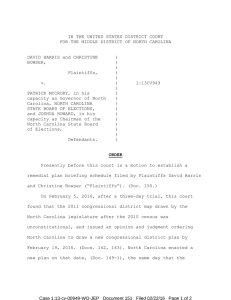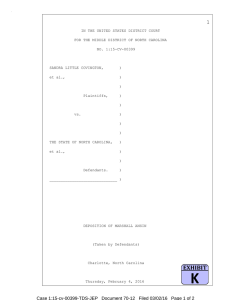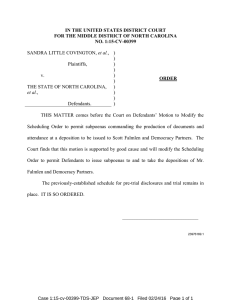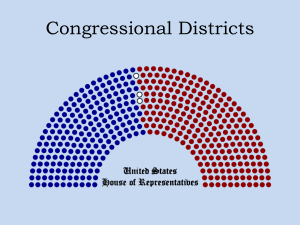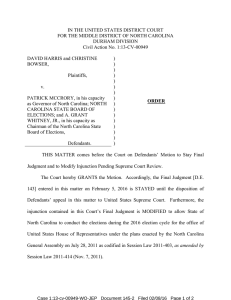THE UNITED STATES DISTRICT COURT FOR THE DISTRICT OF SOUTH CAROLINA
advertisement
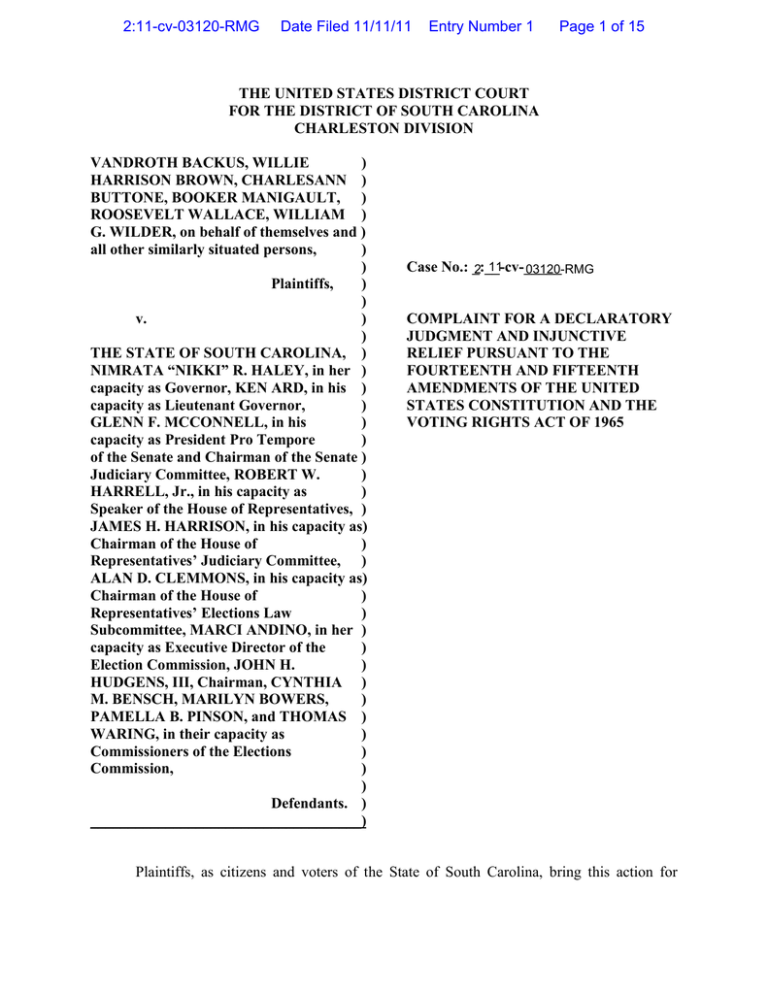
2:11-cv-03120-RMG Date Filed 11/11/11 Entry Number 1 Page 1 of 15 THE UNITED STATES DISTRICT COURT FOR THE DISTRICT OF SOUTH CAROLINA CHARLESTON DIVISION VANDROTH BACKUS, WILLIE ) HARRISON BROWN, CHARLESANN ) BUTTONE, BOOKER MANIGAULT, ) ROOSEVELT WALLACE, WILLIAM ) G. WILDER, on behalf of themselves and ) all other similarly situated persons, ) ) Plaintiffs, ) ) v. ) ) THE STATE OF SOUTH CAROLINA, ) NIMRATA “NIKKI” R. HALEY, in her ) capacity as Governor, KEN ARD, in his ) capacity as Lieutenant Governor, ) GLENN F. MCCONNELL, in his ) capacity as President Pro Tempore ) of the Senate and Chairman of the Senate ) Judiciary Committee, ROBERT W. ) HARRELL, Jr., in his capacity as ) Speaker of the House of Representatives, ) JAMES H. HARRISON, in his capacity as) Chairman of the House of ) Representatives’ Judiciary Committee, ) ALAN D. CLEMMONS, in his capacity as) Chairman of the House of ) Representatives’ Elections Law ) Subcommittee, MARCI ANDINO, in her ) capacity as Executive Director of the ) Election Commission, JOHN H. ) HUDGENS, III, Chairman, CYNTHIA ) M. BENSCH, MARILYN BOWERS, ) PAMELLA B. PINSON, and THOMAS ) WARING, in their capacity as ) Commissioners of the Elections ) Commission, ) ) Defendants. ) ____________________________________) Case No.: _:__-cv-_____ 2 11 03120-RMG COMPLAINT FOR A DECLARATORY JUDGMENT AND INJUNCTIVE RELIEF PURSUANT TO THE FOURTEENTH AND FIFTEENTH AMENDMENTS OF THE UNITED STATES CONSTITUTION AND THE VOTING RIGHTS ACT OF 1965 Plaintiffs, as citizens and voters of the State of South Carolina, bring this action for 2:11-cv-03120-RMG Date Filed 11/11/11 Entry Number 1 Page 2 of 15 declaratory and injunctive relief, respectfully would show unto the Court: NATURE OF THE ACTION 1. Plaintiffs are entitled to a declaratory judgment and injunctive relief to prevent the implementation and enforcement of the STATE OF SOUTH CAROLINA’S redistricting law that illegally uses race to draw election districts for the United States House of Representatives (Congressional Districts) in violation of the Constitution and laws of the United States. The STATE OF SOUTH CAROLINA and the other above named Defendants passed into law Act 75 of 2011 (Act 75), which became effective following federal administrative preclearance under Section 5 of the Voting Rights Act, 42 U.S.C. § 1973c. The South Carolina General Assembly was required to pass legislation drawing new congressional districts pursuant to Article I of the United States Constitution and the results of the 2010 Census which apportioned a new seventh congressional seat to the STATE OF SOUTH CAROLINA for representation in the United States House of Representatives. 2. In debating, drafting, and passing Act 75, Defendants discriminated on the basis of race and packed black voters into the Sixth Congressional District in violation of the United States Constitution and federal law. As a result of Defendants’ unlawful discrimination, Act 75 diminishes black voters’ opportunity to equally participate in the political process by diluting their voting strength. Defendants’ race-based redistricting scheme uses race as the predominant factor in drawing district boundaries and abandons traditional, racially-neutral redistricting principles that would have afforded black voters an equal opportunity to participate in the political process. Act 75 creates a system of voting apartheid in South Carolina that segregates white and black voters into election districts by using a predetermined percentage to assign voters to election district based on race. This racial quota system has resulted in elections that are always or almost always decided by the district’s majority race. 2 2:11-cv-03120-RMG 3. Date Filed 11/11/11 Entry Number 1 Page 3 of 15 Plaintiffs, who are all black or African American voters, seek a Declaratory Judgment on behalf of themselves and all similarly situated persons, that Act 75 violates their civil rights protected by the Fourteenth Amendment, the Fifteenth Amendment, and the Voting Rights Act of 1965, 42 U.S.C. § 1973, et seq. Plaintiffs seek a temporary injunction preventing the irreparable harm that will result from the implementation of Act 75 pending the outcome of this litigation. Plaintiffs also seek a permanent injunction enjoining Defendants from implementing and enforcing Act 75 and directing Defendants to enact a redistricting plan that adheres to traditional, racially-neutral redistricting principles rather than illegal race-based classifications. JURISDICTION AND VENUE 4. This action arises under Article I, §§ 2 and 4 and the Fourteenth and Fifteenth Amendments of the United States Constitution and the Voting Rights Act of 1965, as amended, 42 U.S.C. § 1973, et seq. 5. This court has subject matter jurisdiction pursuant to 28 U.S.C. §§ 1331, 1343(3) and (4), 2201, and 2284, as well as, 42 U.S.C. §§ 1973, 1981, and 1983; 6. Venue is proper pursuant to 28 U.S.C. § 1391(b) and 28 U.S.C. § 2284; PARTIES 7. Plaintiff, VANDROTH BACKUS, is a registered voter and a resident of Florence County, South Carolina. REV. BACKUS presently resides in the Sixth Congressional District. Act 75 harms REV. BACKUS, a black voter, by discriminating against him on the basis of race for the purpose of including or excluding him from an election district. 8. Plaintiff, WILLIE HARRISON BROWN, is a registered voter and a resident of Sumter County, South Carolina. MR. BROWN presently resides in the Fifth Congressional District. Act 75 harms MR. BROWN, a black voter, by discriminating against him on the basis 3 2:11-cv-03120-RMG Date Filed 11/11/11 Entry Number 1 Page 4 of 15 of race for the purpose of including or excluding him from an election district. 9. Plaintiff, CHARLESANN BUTTONE, is a registered voter and a resident of Georgetown County, South Carolina. MS. BUTTONE presently resides in the First Congressional District. Act 75 harms MS. BUTTONE, a black voter, by discriminating against her on the basis of race for the purpose of including or excluding her from an election district. 10. Plaintiff, BOOKER MANIGAULT, is a registered voter and a resident of Berkeley County, South Carolina. MR. MANIGAULT presently resides in the First Congressional District. Act 75 harms MR. MANIGAULT a black voter, by discriminating against him on the basis of race for the purpose of including or excluding him from an election district. 11. Plaintiff, ROOSEVELT WALLACE, is a registered voter and a resident of Darlington County, South Carolina. MR. WALLACE presently resides in the Fifth Congressional District. Act 75 harms MR. WALLACE, a black voter, by discriminating against him on the basis of race for the purpose of including or excluding him from an election district. 12. Plaintiff, WILLIAM G. WILDER, is a registered voter and a resident of Charleston County, South Carolina. MR. WILDER presently resides in the First Congressional District. Act 75 harms MR. WILDER, a black voter, by discriminating against him on the basis of race for the purpose of including or excluding him from an election district. 13. Plaintiffs and all other similarly situated black voters were assigned to their new congressional districts as a result of being subjected to a racial classification. Plaintiffs and all other black voters are personally injured by being subjected to an illegal racial classification and by being placed into election district in accordance with this race-based scheme rather than in accordance with traditional, race-neutral redistricting principles that require geographic compactness, keeping political subdivisions intact, and keeping communities of interest intact. 4 2:11-cv-03120-RMG Date Filed 11/11/11 Entry Number 1 Page 5 of 15 These traditional racially-neutral redistricting principles, denied to Plaintiffs in passing Act 75, would have facilitated equal participation in the political process. 14. Defendant, the STATE OF SOUTH CAROLINA, is a proper defendant as a state subject to the limitations of the Fourteenth Amendment and Fifteenth Amendments of the United States Constitution, as a political subdivision subject to the provisions and requirements of Section 2 of the Voting Rights Act of 1965, 42 U.S.C. § 1973, et seq. 15. Defendant, NIKKI R. HALEY, in her official capacity as Governor of South Carolina, is a proper defendant as the Chief Executive of the State of South Carolina charged with the enforcement of the state’s laws under Article IV, Section 15 of the South Carolina Constitution. 16. Defendant, KEN ARD, in his official capacity as Lieutenant Governor of South Carolina, is a proper defendant as the President of the South Carolina Senate charged with presiding over the Senate and ratifying bills upon passage by both houses of the General Assembly pursuant to Article III, Section 18 of the South Carolina Constitution. 17. Defendant, GLEN F. MCCONNELL, in his official capacity as President Pro Tempore of the South Carolina Senate and Chairman of the Senate Judiciary Committee, is a proper defendant as leader of the Senate and Chairman of the Judiciary Committee responsible for drafting and passing reapportionment legislation for consideration by the full Senate. 18. Defendant, ROBERT W. HARRELL, JR., in his official capacity as Speaker of the South Carolina House of Representatives, is a proper defendant as leader of the House charged with presiding over the House and ratifying bills upon passage by both houses of the General Assembly pursuant to Article III, Section 18 of the South Carolina Constitution. Speaker HARRELL is also the state official authorized by Act 75 to seek preclearance as required by Section 5. 5 2:11-cv-03120-RMG 19. Date Filed 11/11/11 Entry Number 1 Page 6 of 15 Defendant, JAMES H. HARRISON, in his official capacity as a member of the South Carolina House of Representatives, is a proper defendant as Chairman of the Judiciary Committee responsible for drafting and passing reapportionment legislation for consideration by the full House. 20. Defendant, ALAN D. CLEMMONS, in his official capacity as a member of the South Carolina House of Representatives, is a proper defendant as Chairman of the Election Laws Subcommittee responsible for drafting and passing reapportionment legislation for consideration by the Judiciary Committee and the full House. 21. Defendant, MARCI ANDINO, in her official capacity as the Executive Director of the South Carolina Elections Commission, is a proper defendant as the head of the South Carolina agency responsible for implementing and conducting elections pursuant to S.C. Code Ann. §§ 7-3-10, et seq. and 7-13-10, et seq., as amended. 22. Defendants, JOHN H. HUDGENS, III, Chair, CYNTHIA M. BENSCH, MARILYN BOWERS, PAMELLA B. PINSON, and THOMAS WARING, in their official capacity, are members of the South Carolina Elections Commission Board. All Defendants are proper defendants as persons charged with the powers and duties of the South Carolina Elections Commission pursuant to S.C. Code Ann. §§ 7-3-10, et seq. and 7-13-10, et seq., as amended. STATEMENT OF FACTS 23. In 2001, the South Carolina General Assembly passed legislative redistricting plans for the House, Senate and Congress. Then-Governor James H. Hodges vetoed the bill and the General Assembly failed to override his veto. A malapportionment lawsuit was filed in the United States District Court for the District of South Carolina under the caption Colleton County Council v. McConnell. On March 20, 2002, the three judge Court issued an order drawing districts for the state House, state Senate, and six Congressional districts. Colleton County 6 2:11-cv-03120-RMG Date Filed 11/11/11 Entry Number 1 Page 7 of 15 Council v. McConnell, 201 F.Supp.2d 618 (D.S.C. 2002). While the General Assembly subsequently modified the Court’s plan for the House and Senate, no legislation was passed to modify the congressional districts. The Colleton County Council congressional plan (hereinafter “Benchmark Plan”) remained in effect until the enactment of Act 75. 24. Under the Benchmark Plan, South Carolina was apportioned six seats in the United States House of Representatives. The 2010 Census results entitled South Carolina to one additional congressional seat for a total of seven congressional districts. Pursuant to the 2010 Census, the Benchmark Plan does not draw a sufficient number of congressional districts to afford South Carolina adequate representation in the United States House of Representatives and needed to be redrawn to create a new seventh Congressional District. In order to comply with the mandate of one person, one vote, Reynolds v. Sims, 377 U.S. 533, 84 S.Ct. 1362 (1964), the seven new congressional districts must have a population of or about six hundred and sixty thousand, seven hundred and sixty-six (660,766) persons. 25. According to the 2010 Census, South Carolina’s population has grown from 4,012,012 persons to 4,625,364 persons over the last ten years. This constitutes an increase of more than fifteen (15%) percent. South Carolina has a large black minority population that has grown proportionally to the State’s overall growth. The non-Hispanic black population is relatively equal as a percentage of the overall population compared to ten years ago. Presently South Carolina’s non-Hispanic black population is 1,290,684, or almost twenty-eight (27.9%) percent of the overall population. In 2000, the non-Hispanic black population was 1,186,071, or twenty-nine (29.6%) percent of the overall population. 26. Despite overall population growth in South Carolina, this growth was not uniform across the State’s forty-six (46) counties. Thirty-four (34) counties increased population while twelve (12) counties lost population. Of the twelve (12) counties that lost population, six (6) of 7 2:11-cv-03120-RMG Date Filed 11/11/11 Entry Number 1 Page 8 of 15 those counties are small rural counties with a majority black population.1 The other six (6) counties that lost population have a significant black population.2 Districts representing urban and suburban areas saw the greatest growth during this period.3 As a result of these changes, over the last ten years the black population in South Carolina has naturally shifted from rural and urban areas to become increasingly integrated with the white population in suburban areas. 27. In April 2011, the General Assembly began the process of debate and drafting of House Bill 3002 (H. 3002) that would serve as the legislative vehicle for congressional redistricting legislation. Members of the General Assembly claimed they were drawing a redistricting plan motivated by traditional redistricting principles and mandates imposed by federal law. Traditional redistricting principles include compactness, keeping county and municipal boundaries intact, and keeping communities of interest intact. See Colleton Co., supra. 28. In actuality, the General Assembly drew maps that achieved a predetermined and artificially manipulated percentage of black voting age population (VAP) for each district as decided by leaders in the General Assembly. 29. The General Assembly decided on and achieved a redistricting plan that (1) added black VAP percentage to the Sixth District, (2) reduced the black VAP percentage in all or almost all of the other existing districts, and (3) kept the black VAP percentage low enough in the new Seventh District to make it unlikely black voters could have an equal opportunity to elect a candidate of their choosing in the Seventh District. 30. Under the Benchmark Plan, the Sixth District when drawn in 2002 had a black VAP of fifty-three (53.55%) percent. Natural population shift over the last ten years lowered the 1 Allendale (73.6%), Bamberg (61.5%), Hampton (53.9%), Lee (64.3%), Marion (55.9%), and Williamsburg (65.8%) 2 Abbeville (28.3%), Barnwell (44.3%), Calhoun (42.6%), Chester (37.4%), Laurens (25.4%), and Union (31.3%) 3 E.g., Beaufort, Berkeley, Dorchester, Greenville, Horry, Lancaster, Lexington, Richland, York 8 2:11-cv-03120-RMG Date Filed 11/11/11 Entry Number 1 Page 9 of 15 black VAP percentage of the Sixth District under the Benchmark Plan to fifty-two (52.08%) percent – the largest natural decrease per capita of black VAP among the six districts. Conversely, the Second District saw the largest increase in black VAP under the Benchmark due to natural population shift from twenty-three (23.95%) percent when the Benchmark was enacted to twenty-five (25.43%) percent as of 2010. 31. Act 75 raises the black VAP to fifty-five (55.18%) percent of the new Sixth District. With the exception of the Fourth4 and Sixth Districts, the black VAP percentage in all of the other districts decreases compared to the Benchmark. 32. Consequently, Act 75 dilutes black voting power by packing black voters into the Sixth District and dispersing their influence in the remaining districts. 33. It was not necessary to raise the black VAP percentage in the Sixth District in order to give minority voters in the District an opportunity to elect a candidate of their choosing. 34. Act 75 creates no districts, other than the Sixth District, where black voters have an opportunity to elect a candidate of their choosing. 35. In order to draw districts that met the preselected racial quota, the General Assembly was required to abandon traditional redistricting principals like compactness, keeping political subdivisions intact, and keeping communities of interest intact, and instead used racebased discrimination to decide which voters belong in which districts. 36. The General Assembly passed and enrolled H. 3002 as Act 75 on July 26, 2011. Governor NIKKI R. HALEY signed the bill into law and it became effective on August 1, 2011, subject to federal preclearance. South Carolina is a “covered jurisdiction” under Section 5 of the Voting Rights Act of 1965, 42 U.S.C. § 1973c. As such, the State is required to obtain either judicial or administrative preclearance prior to enacting any change in voting law. Id. On 4 The Fourth District increases only nominally from 18.19% to 18.23%. 9 2:11-cv-03120-RMG Date Filed 11/11/11 Entry Number 1 Page 10 of 15 August 30, 2011, ROBERT W. HARRELL, JR. and GLENN F. MCCONNELL submitted Act 75 to the United States Attorney General for administrative preclearance. Contemporaneous with this submission, Defendants filed suit in the United States District Court for the District of Columbia seeking judicial preclearance. On October 28, 2011, the Attorney General, through his agent, notified Defendants that the Attorney General will not interpose any objection to Act 75. As such, Defendants’ lawsuit in the District of Columbia, Harrell v. United States of America, 1:11-cv-01566-EGS, seeking judicial preclearance under Section 5, is moot. 37. Pursuant to 42 U.S.C. § 1973c(a), Plaintiffs’ action against Defendants for declaratory and injunctive relief is now timely to enforce their rights under the United States Constitution and the Voting Rights Act of 1965. 38. At all times relevant herein, Defendants acted under color of state law. 39. Defendants’ race-based scheme denies Plaintiffs the equal protection of law, abridges their right to vote, and violates the protection afforded them by the Voting Rights Act of 1965, 42 U.S.C. § 1973, et seq. FIRST CAUSE FOR DECLARATORY AND INJUNCTIVE RELIEF: ACT 75 DENIES MINORITY VOTERS EQUAL PROTECTION UNDER THE LAW 40. Plaintiffs incorporate Paragraphs 1-39 as if set forth verbatim herein. 41. Plaintiffs and all other black voters are entitled to the equal protection of law under the Fourteenth Amendment of the United States Constitution. 42. Act 75 discriminates against Plaintiffs and all other black voters on the basis of race in one of more of the ways set forth below, each sufficient to demonstrate race-based discrimination used to include or exclude voters from election districts: a. Act 75 has a discriminatory purpose evidenced by the demographics of the plan as a whole; 10 2:11-cv-03120-RMG b. Date Filed 11/11/11 Entry Number 1 Page 11 of 15 Act 75 has a discriminatory purpose evidenced by the demographics of specific districts, particularly the First, Second, Fifth, Sixth, and Seventh Districts. Act 75 unnecessarily packs black voters into the Sixth District with the effect of diluting black voting power by limiting the number of districts where they have an equal opportunity to participate in electing a candidate of their choosing; c. Act 75 has a discriminatory purpose evidenced by the irregular shape of its districts that ignore traditional redistricting principles and natural population shifts in favor of a racial classification used to artificially manipulate the black VAP of each district; d. Defendants’ purpose in passing Act 75, either in whole or in part, was motivated by race and/or the goal of drawing districts with specific racial composition in each district; e. The shape of the districts drawn by Act 75 are so irrational that they can only be explained as a race-based gerrymander; f. In other ways as proven during the trial of this matter. 43. Defendants’ use of race in drawing election district lines is not strictly necessary to serve a compelling governmental purpose. Defendants have offered no justification as to why they discriminated on the basis of race in drawing election districts. 44. Defendants’ use of race is not the least restrictive means available to give black voters an opportunity to participate equally in the political process. 45. Plaintiffs and all black voters are denied equal protection under the law and injured by the STATE OF SOUTH CAROLINA, and her agents, the other above-named defendants, when the State uses race-based discrimination without a compelling governmental purpose or where less restrictive means are available. 11 2:11-cv-03120-RMG 46. Date Filed 11/11/11 Entry Number 1 Page 12 of 15 Plaintiffs have no adequate remedy at law other than the judicial relief sought here. The failure to temporarily and permanently enjoin enforcement of Act 75 will irreparably harm Plaintiffs’ constitutional and statutory rights. SECOND CAUSE FOR DECLARATORY AND INJUNCTIVE RELIEF: ACT 75 VIOLATES SECTION TWO OF THE VOTING RIGHTS ACT OF 1965 47. Plaintiffs incorporate Paragraphs 1-46 as if set forth verbatim herein. 48. Section 2 of the Voting Rights Act of 1965, prohibit the abridgement of the right to vote on account of race, color, or language minority. 42 U.S.C. § 1972(a). 49. Diluting minority voting power constitutes an abridgement of the right to vote for the purpose of Section 2. Voinovich v. Quilter, 507 U.S. 146, 154, 113 S. Ct. 1149, 1155 (1993). 50. “Dilution of racial minority group voting strength may be caused” either “by the dispersal of blacks into districts in which they constitute an ineffective minority of voters or from the concentration of blacks into districts where they constitute an excessive majority.” Id. 51. Act 75 dilutes minority voting strength by packing black voters into the Sixth District, thus diluting black voting strength in all other election districts, particularly the First, Second, Fifth, and Seventh Districts. 52. Black voters in the Sixth District have already demonstrated an overwhelming ability to elect their candidate of choice in a district with a fifty-three (53.55%) percent black VAP even as natural population shift slowly reduced the black VAP percentage over the last ten years to fifty-two (52.08%) percent. Defendants have offered no evidence of why it was necessary to now increase the black VAP percentage in the Sixth District to fifty-five (55.18%) percent. Act 75 also dilutes the voting power of voters outside of the Sixth District as a result of the packing Defendants engaged in in the Sixth District. Black voters excluded from the Sixth are disbursed in the other six districts in small enough numbers to deny them any opportunity to 12 2:11-cv-03120-RMG Date Filed 11/11/11 Entry Number 1 Page 13 of 15 elect a candidate of choice through crossover voting. 53. Had Defendants observed traditional redistricting principles instead of illegally packing voters into the Sixth District, they could have drawn districts that preserved the black community’s ability to elect a candidate of their choosing in the Sixth District and give black voters an opportunity to elect a candidate of their choosing in one or more of the abovementioned districts. 54. Consequently, Act 75 ensures that some Plaintiffs and black voters are guaranteed to elect a candidate of their choosing while other Plaintiffs and black voters have no opportunity to elect a candidate of their choosing. Act 75 also denies Plaintiffs an opportunity to participating equally in the political process. 55. Plaintiffs have no adequate remedy at law other than the judicial relief sought here. The failure to temporarily and permanently enjoin enforcement of Act 75 will irreparably harm Plaintiffs’ constitutional and statutory rights. THIRD CAUSE FOR DECLARATORY AND INJUNCTIVE RELIEF: ACT 75 VIOLATES THE FIFTEENTH AMENDMENT 56. Plaintiffs incorporate Paragraphs 1-55 as if set forth verbatim herein. 57. The Fifteenth Amendment of the United States Constitution, prohibits the denial or abridgement of the right to vote on account of race, color, or previous condition of servitude. U.S. CONST. amend XV. 58. The Fifteenth Amendment protects minority voters from being disenfranchised by race-based gerrymanders. Gomillion v. Lightfoot, 364 U.S. 339, 341, 81 S. Ct. 125, 127, (1960). 59. Act 75 uses race to dilute black voting power in one or more of the manners stated above, incorporated here as if set forth verbatim. 60. Consequently, Act 75 denies black voters an equal opportunity to participate in 13 2:11-cv-03120-RMG Date Filed 11/11/11 Entry Number 1 Page 14 of 15 the political process which could have been achieved by adopting racially-neutral redistricting principles that would give Plaintiffs and all black voters an equal opportunity to participate in the political process. 61. Plaintiffs have no adequate remedy at law other than the judicial relief sought here. The failure to temporarily and permanently enjoin enforcement of Act 75 will irreparably harm Plaintiffs’ constitutional and statutory rights. REQUEST FOR A THREE-JUDGE COURT 62. Plaintiffs request trial of this case by a three-judge court pursuant to 42 U.S.C. § 1973c(a) and 28 U.S.C. § 2284. PRAYER FOR RELIEF WHEREFORE, having fully set forth their allegations against Defendants, Plaintiffs respectfully request that this Court: (i) Assume jurisdiction of this case and try it before a three-judge court; (ii) Temporarily enjoin Defendants from calling, holding, supervising, or certifying any elections under Act 75 pending the outcome of this litigation; (iii) Issue a declaratory judgment that Act 75 is illegal for one or more of the reasons set forth above. (iv) Permanently enjoin Defendants from calling, holding, supervising, or certifying any elections under Act 75; (v) Set a reasonable deadline for Defendants to enact and adopt a redistricting plan for congressional districts that does not violate Plaintiffs’ constitutional or statutory rights; (vi) Retain jurisdiction while Defendants enact a plan by this Court’s deadline; (vii) Order a new redistricting plan in the event that Defendants fail to adopt a 14 2:11-cv-03120-RMG Date Filed 11/11/11 Entry Number 1 Page 15 of 15 plan or fail to adopt a plan that conforms with this Court’s judgment; (viii) Adjudge all reasonable attorneys’ fees, costs, and expenses against Defendants in favor of Plaintiffs pursuant to 42 U.S.C. §§ 1973l(e) and 1988(b), as amended; (ix) Grant other such relief as this Court deems just and proper. Respectfully submitted by: s/Richard A. Harpootlian Richard A. Harpootlian (Fed. ID # 1730) rah@harpootlianlaw.com Graham L. Newman (Fed. ID # 9746) gln@harpootlianlaw.com M. David Scott (Fed. ID # 8000) mds@harpootlianlaw.com RICHARD A. HARPOOTLIAN, P.A. 1410 Laurel Street Post Office Box 1090 Columbia, SC 29202 Telephone: (803) 252-4848 Facsimile: (803) 252-4810 ATTORNEYS FOR PLAINTIFF Columbia, South Carolina November 11, 2011 15

